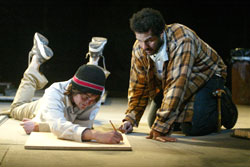SITE GUIDE
SEARCH
REVIEWS
REVIEW ARCHIVES
ADVERTISING AT CURTAINUP
FEATURES
NEWS
Etcetera and
Short Term Listings
LISTINGS
Broadway
Off-Broadway
NYC Restaurants
BOOKS and CDs
OTHER PLACES
Berkshires
London
California
Connecticut
New Jersey
DC
Philadelphia
Elsewhere
QUOTES
TKTS
PLAYWRIGHTS' ALBUMS
LETTERS TO EDITOR
FILM
LINKS
MISCELLANEOUS
Free Updates
Masthead
Writing for Us
A CurtainUp Review
Light Raise the Roof
By Les
Gutman
|
We poor so they go the right to pick us up 'gainst our will, whisk us away to shelters, wherever, 'boveground half the people I know jus' vanished don't tell me it's cuz Mr. Mayor come down offer 'em all jobs. ---Cole |

R. Beitzel and C. McKinney (Photo: Joan Marcus)
|
Levitt and Lefrak may have recognized that building affordable housing for the middle class was a worthy and profitable calling, but Cole (Chris McKinney) has his own niche: constructing dwellings for the poor or, more particularly, the homeless. Inspired by Wright's Usonian houses, he constructs makeshift dwelling to order, wherever and however he can. But he has a bigger dream: taking over an abandoned schoolhouse, and converting it into apartments for "homesteaders" -- also known as "squatters," though that's an undesirable expression.
Kia Corthron's new play touches on a wide range on issues and circumstances: how homelessness comes about, the varying mentalities of the homeless, the way the government "deals" with the problem, shelters, activism, the "mole people", the mentally ill, the children, etc. On the one hand, it's a zeitgeist play; on the other, it seeks to tell a group of particularized stories.
At the former, it succeeds to some extent, though I doubt many in the audience learn anything they didn't already know. At the latter, it is less successful. Corthron introduces character after character to interact with Cole, and a host of subsidiary stories, but she doesn't seem to have figured out what to make of them. We, and the characters, are left adrift. In the end, her play has either too much plot, or not enough, and director Michael John Garces does not find a way to overcome this.
Free (J. Kyle Manzay) is a crack addict who essentially hustles customers for Cole, and reacts to his sister, Bebbie (April Yvette Thompson), disparaged for living with relatives. He is a keenly observed "type," and Manzay nails it, but nothing more is gained from his presence. Zekie (Robert Beitzel) is a sweet-natured young man who is on the streets post-institutionalization. He suffers both physical and mental ailments (rendered with excruciating accuracy by Beitzel in a performance that is as terrific as it is difficult) but has a talent for home design such that Cole wants him as a partner in his efforts. After one of several "cleanups" of homeless dwellings by the authorities, Zekie disappears for a time. Much of the play involves Cole's search for him though, even when he returns, there is no payoff. Aside from McKinney's strong core performance, these two men are the highlights of the acting company.
Narelle Sissons provides a highly inventive set that integrates both the makeshift shacks and other settings beautifully and effectively. Allen Lee Hughes lights the show impressively, Gabriel Berry's costumes are perfect and Robert Kaplowitz's sound design adds much texture to the play.
It adds up to very little unfortunately, as Corthron has not found a way to bring the audience into a situation that is any more affecting than the way we superficially view the homeless when we see them on the street. Her passions are palpable, and her subject important, which makes it all the more disappointing that her play doesn't resonate.
|
Light Raise the Roof by Kia Corthron Directed by Michael John Garces with Moe Moe Alston, Robert Beitzel, Caroline Stefanie Clay, Romi Dias, Royce Johnson, Mia Katigbak, J. Kyle Manzay, Chris McKinney, Andres Munar, April Yvette Thompson and Colleen Werthman Set Design: Narelle Sissons Lighting Design: Allen Lee Hughes Costume Design: Gabriel Berry Sound Design: Robert Kaplowitz Running time: 2 hours, 30 minutes with 1 intermission New York Theatre Workshop, 79 East 4th Street (2nd AV/Bowery) Telephone (212) 239-6200 TUES - SAT @8, SAT - SUN @2, SUN@7 (no performance 5/21); $55 Opening May 20, 2004, closes June 13, 2004 Reviewed by Les Gutman based on 5/18/04 performance |

Retold by Tina Packer of Shakespeare & Co.
Click image to buy.

Mendes at the Donmar
Our Review

At This Theater

Leonard Maltin's 2003 Movie and Video Guide

Ridiculous!The Theatrical Life & Times of Charles Ludlam

6, 500 Comparative Phrases including 800 Shakespearean Metaphors by CurtainUp's editor.
Click image to buy.
Go here for details and larger image.



